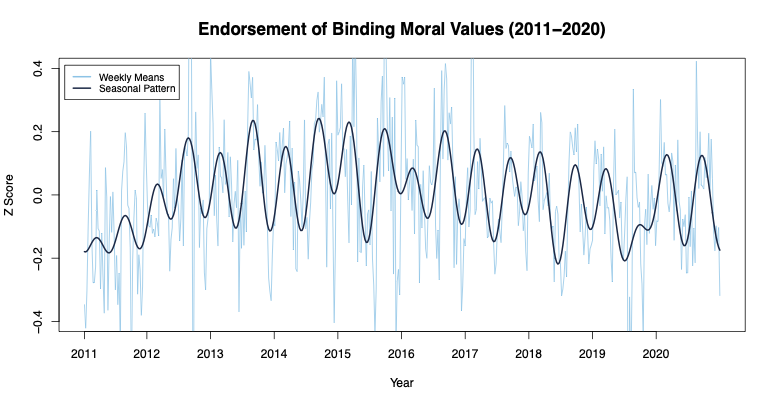If you ask citizens of wealthy English-speaking countries which moral values they consider most important, their answers vary by the time of year, according to a new study. Naturally, the variation is not enormous, or people would have noticed it before, but it is large and surprisingly consistent over many years and may shape choices when it comes to election time.
When Robert Bolt called Sir Thomas More “A Man For All Seasons” (borrowing from More’s contemporary Whittington), he was referring to the way More held true to his values even as the political climate shifted around him. The implication was that this was rare, but “Seasons” was used metaphorically, and it probably didn’t occur to anyone that it might be relevant for literal seasons of the year.
However, University of British Columbia researchers thought to check and found that for many of us, the time of year does affect what we believe.
Social scientists have been asking people about the importance of values like loyalty and kindness for decades as a way to understand their behavior.
Based on an impressive sample of 232,975 people, their data collected through yourmorals.org, UBC doctoral student Ian Hohm looked at whether the views of these values shift with the seasons, and found that they do, but in some curious ways.
Purity, loyalty, and respect for authority – values venerated by traditional conservatism – often go together, and are collectively known as “binding values”, so it is no surprise they rise and fall together over the course of a year.
What is stranger is that instead of peaking in summer or winter, this trio is most valued in spring and fall, and considered less important both when it is hot and cold. The effect was far stronger than required to meet tests of statistical significance and remained robust when controlling for the fact that older and wealthier people were more responsive in spring and summer.

How survey respondents considered purity, loyalty, and respect for authority, showing a clear seasonal trend.
Image credit: Evolutionary Social Cognition Laboratory at UBC
Meanwhile, values typically emphasized by liberals and progressives, like fairness and caring for others, showed less variation throughout the year. To the extent they did, the pattern was less clearly seasonal. Consequently, in summer and winter, they were more influential, relatively speaking.
“People’s endorsement of moral values that promote group cohesion and conformity is stronger in the spring and fall than it is in the summer and winter,” Holm said in a statement. “Moral values are a fundamental part of how people make decisions and form judgments, so we think this finding might just be the tip of the iceberg in that it has implications for all sorts of other downstream effects.”
Historically, this means US conservatives may have had a small boost from the requirement to hold elections at the start of November. Whether American history would be significantly different if they were held in summer or winter is hard to tell. This survey could also not tell if this advantage has been weakened now that a number of those who call themselves “conservative” have become openly contemptuous of the authority of science.
In countries where the prime minister or president gets to choose the date of the election, the findings could be even more interesting to politicians. The authors looked at other English-speaking countries and found a similar pattern in Australia and Canada. In the UK, on the other hand, support for binding values fell strongly in summer, but peaked in winter. However, in each case the sample size was less than a tenth of that available for the US, so these results require more caution.
It seems logical that people’s values will change more with the seasons in places where the difference between summer and winter is greater than where seasons are barely a thing. Indeed, the variation observed was considerably larger for Canada than Australia, but the authors didn’t break the US variation down by state to see if Alaskan values vary more than, for example, Floridian values.
Explanations for this pattern might be easier to come up with if winter and summer were opposites, instead of close matches, but the authors did find a major clue in terms of mood. Americans are more anxious in spring and fall, a follow-up study using similar methods found. “This correlation suggests that higher anxiety may drive people to seek comfort in the group norms and traditions upheld by binding values,” said senior author Professor Mark Schaller. Schaller has recently published work on how much seasons affect other aspects of psychology.
The data was collected weekly over ten years, and the same pattern was seen each time, so it’s unlikely it was too skewed by specific events of a particular season. Then again, anniversaries like September 11 could be an ongoing factor unrelated to the weather, and the authors speculate Christmas may have some influence.
The authors also note that it is not just elections that could be affected by these trends. Criminal convictions imply a disrespect for authority, and suggest further investigation into whether judges impose heavier penalties in certain seasons as a result. Moral values also shape how we respond to crises, with the authors using the COVID-19 pandemic as an example. Knowing that respect for authority and loyalty are higher at some times than others might affect the targeting of public health campaigns.
The study is published in Proceedings of the National Academy of Sciences.
Source Link: Forget Changing With Age, People's Moral Values Change With The Seasons